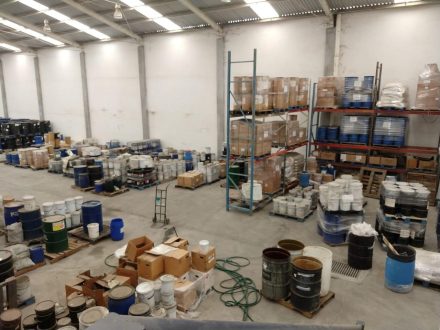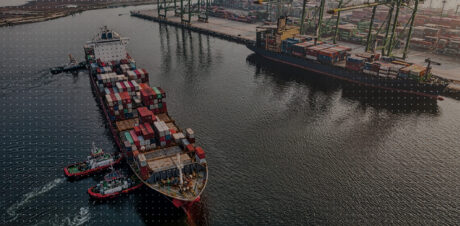An accused fentanyl producer arrested by Mexican authorities earlier this year owns and operates several chemical companies, an investigation by Sayari has found. These companies could be channels for importing illegal fentanyl precursors into Mexico or diverting legal precursor chemicals into clandestine labs.
This case highlights the importance of conducting due diligence to identify the shareholders and officers of a potential customer. Effective use of public records in this case reveals these companies’ links to the manufacture of illicit drugs. Catching this risk early could help chemical companies avoid having their products diverted to illicit uses.
Background: Catching a Fentanyl Producer
In June, Mexican law enforcement officials, in coordination with the U.S. Drug Enforcement Administration, arrested Mexican national Jose Guadalupe Almaguer Herrera and seized a warehouse just outside the northern industrial city of Monterrey, Nuevo Leon. Following the arrest, Mexican authorities alleged that Almaguer Herrera used the warehouse as a clandestine laboratory to produce fentanyl.
Media reporting has highlighted that Almaguer Herrera is a chemist and the owner of a chemical company located in the outskirts of Monterrey, Ampex Chemicals, S.A. de C.V.
Mexican corporate records accessed through Sayari Search reveal that Almaguer Herrera is also a shareholder of at least four other chemical companies:
- Quantyka S.A. de C.V. (Guadalajara, Jalisco, Mexico)
- Analytyka de Mexico, S.A. de C.V. (Monterrey, Nuevo Leon, Mexico)
- Procesos Quimicos Especializados, S.A. de C.V. (García, Nuevo Leon, Mexico)
- Comercializadora Don Peto, S.A. de C.V. (Monterrey, Nuevo Leon, Mexico)
All but one of the companies, Quantyka, are located near Monterrey.
Almaguer Herrera is a 50 percent shareholder of all four companies. He also serves as the administrator for Quantyka, Analytyka de Mexico, and Comercializadora Don Peto.
Mexican court filings haven’t revealed precisely how he obtained the necessary precursor chemicals to synthesize fentanyl. However, his control of several chemical companies may have enabled him to import illegal fentanyl precursor chemicals. They could also have served as channels for diverting legally imported precursors to his clandestine lab.
Diversion of Fentanyl Precursors
Fentanyl is a synthetic drug, which means that production is strictly dependent on the supply of precursor chemicals. Many of these are legal chemicals that have legitimate uses in pharmaceutical manufacturing or industrial processes. As a result, illicit actors often acquire these chemicals from legitimate chemical companies and divert them for use in drug production. China is a key supplier of precursor chemicals for a number of illicit substances, including methamphetamine and fentanyl.
Mexico has taken steps to limit the flow of fentanyl precursor into the country. For example, the government recently scheduled several precursors, making it illegal to import them without receiving government approval. While this move represents a positive step toward curbing fentanyl production in Mexico, several other fentanyl precursors remain legal. Mexican officials have long struggled to curb imports of scheduled chemicals used to synthesize other illicit drugs, such as methamphetamine.
The Growth of Fentanyl Production in Mexico
While the highest purity fentanyl continues to flow from China, recent seizures of fentanyl labs like the one described above demonstrate that Mexico is growing in popularity as a conduit for the flow of fentanyl into the United States.
The seizure of Almaguer Herrera’s lab in Monterrey is not an isolated case. In November, 2017, the Mexican Army seized an illegal fentanyl lab in a rural area of Sinaloa state. And in September, 2018, Mexican and U.S. law enforcement officers disrupted a network involving a Bulgarian national allegedly producing fentanyl in a lab in Mexicali, which sits just across the border from Calexico, California. Finally, this past April, Mexican authorities seized another lab in Sinaloa, this time in the capital city of Culiacan.
Using Public Records to Unearth Connections to Fentanyl Producers
Analysis of public records can be highly effective in identifying the links between these nefarious actors and potential high-risk chemical companies. Analysts can also use digital identifiers, such as social media profile names, to dive deeper into fentanyl networks, many of which operate from a plethora of online chatrooms and social media sites.
The growth of fentanyl production in Mexico suggests that the risk to Mexican chemical companies that their products are diverted into illicit fentanyl labs is on the rise. Public records have a crucial role to play in mitigating this risk.
The public records data used to power this research is available through Sayari Search! If you’re curious how this data could drive insights for your team, please reach out here.



